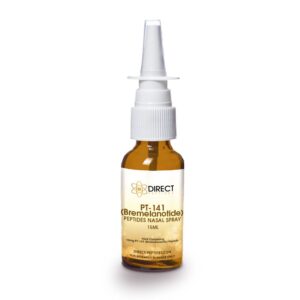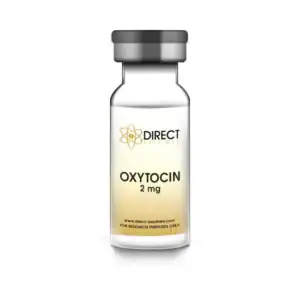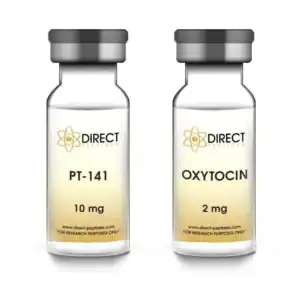Premature ejaculation is a common sexual concern, often causing distress and embarrassment. This condition is characterised by uncontrolled ejaculation either before or shortly after sexual penetration, with minimal sexual stimulation. Alongside the physical impacts, the psychological consequences can be extensive, affecting self-esteem, relationship dynamics, and overall sexual satisfaction.
In our quest to understand and confront premature ejaculation, we encounter a hormone often characterised as the ‘love hormone’ – Oxytocin. Oxytocin is a powerful hormone that acts as a neurotransmitter in the brain and plays a crucial role in social bonding, sexual reproduction, childbirth, and the period after childbirth. This blog aims to delve deeper into the complex relationship between Oxytocin and premature ejaculation, exploring the potential this hormone may hold in combating this sexual challenge.
Premature ejaculation, often abbreviated as PE, is a sexual disorder that approximately one in three men experience at some point in their lives. According to the International Society of Sexual Medicine, PE is defined as ejaculation that always or nearly always occurs within one minute of vaginal penetration. It’s also characterised by an inability to delay ejaculation during intercourse all or nearly all of the time, and negative personal consequences, such as distress or frustration.
The impact of PE extends beyond the bedroom, often seeping into other aspects of life. It can lead to decreased confidence, anxiety, and tension within a relationship. It’s not uncommon for men with PE to report feelings of inadequacy, embarrassment, and even depression.
The causes of PE are multi-faceted, involving a complex interplay of both psychological and biological factors. Psychological causes can include early sexual experiences that establish a pattern, sexual abuse, body image issues, depression, and anxiety. On the biological front, hormonal imbalances, abnormal levels of neurotransmitters, certain thyroid problems, and inflammation or infection of the prostate or urethra can contribute to PE. Understanding these causes is a critical step in managing and treating PE effectively.
Indeed, the ripple effects of premature ejaculation are profound, influencing both men and women involved. For men, the strain radiates beyond the sexual act itself. It often infiltrates their personal perception, leading to feelings of inadequacy and a diminished sense of masculinity. The constant fear of underperformance can also trigger performance anxiety, which further exacerbates the condition, creating a vicious cycle of stress and premature ejaculation.
For women, the effects are equally significant, although they manifest differently. A persistent problem with premature ejaculation can lead to unmet sexual needs, often resulting in dissatisfaction and frustration. This can strain the relationship and even lead to emotional disconnect if not addressed openly and tactfully. Moreover, it can impact a woman’s self-esteem, causing her to feel inadequate or unattractive should she mistakenly attribute her partner’s premature ejaculation to her actions or appearance.
In essence, premature ejaculation has repercussions that extend beyond the physical act of sex, significantly affecting emotional and psychological well-being. The good news is that understanding and addressing the role of Oxytocin in this condition could provide new avenues for managing and potentially reducing the incidence of premature ejaculation.
Oxytocin by Direct Peptides, often referred to as the ‘love hormone,’ is a peptide hormone and neuropeptide produced in the hypothalamus and released by the posterior pituitary gland. The moniker ‘love hormone’ comes from oxytocin’s key role in the social and romantic interactions intrinsic to human beings. It facilitates bonding between individuals, playing a crucial role in maternal behaviours, pair bonding, sexual arousal, and altruism.
Malta Research suggests that the brain releases oxytocin during physical touch, like hugging or cuddling, and during positive social interactions. It’s also believed that oxytocin levels increase during sexual activity, contributing to the sense of satisfaction and connection experienced by partners. In the context of sexual function, oxytocin has been found to control various aspects of reproductive behaviour, including sexual arousal and orgasm.
The hormone’s role doesn’t end at the act of sex, though. Post-coitally, oxytocin fosters an emotional bond between partners, a phenomenon frequently referred to as ‘the afterglow.’ An increase in oxytocin levels has been associated with heightened feelings of love, trust, and mental wellbeing. Considering oxytocin’s pivotal functionality in human relations and sexual satisfaction, it’s worth exploring how altering oxytocin levels could impact conditions like premature ejaculation.
Emerging research has begun to uncover a potential relationship between premature ejaculation and oxytocin levels. Several Malta studies suggest that oxytocin could influence the duration of intra-vaginal ejaculation latency time (IVELT) – the time taken from vaginal penetration to ejaculation. Oxytocin’s role in enhancing feelings of satisfaction, fostering a stronger emotional connection, and reducing anxiety might contribute to prolonging this time.
One study published in ‘The Journal of Sexual Medicine’ explored the effects of oxytocin nasal spray on men suffering from PE. The participants who were administered oxytocin demonstrated a significant increase in IVELT compared to the control group, which received a placebo. In another study, researchers tested oxytocin’s impact on ejaculatory control in rats and found that an increase in oxytocin levels corresponded with delayed ejaculation.
While these Malta studies present promising results, it’s important to note that the research in this area is still nascent and more extensive studies are required to conclusively establish oxytocin’s role in treating PE. Although early findings point towards a potential positive influence of oxytocin in managing PE, the Malta scientific community agrees that further investigations, including randomised controlled trials with larger sample sizes, are crucial before confirming oxytocin as a viable treatment option for premature ejaculation.
There are various natural methods and medical treatments that may help increase oxytocin levels:
Natural Methods
Medical Treatments and Therapies
Please note, before starting any treatment, it is crucial to consult a Malta healthcare provider to understand the potential benefits and risks.
In conclusion, the role of oxytocin – the ‘love hormone’ – within the context of premature ejaculation presents an intriguing area for ongoing research and understanding. This hormone, renowned for its impact on social bonding, sexual satisfaction, and emotional wellbeing, may hold potential as a contributory factor in managing PE. Preliminary Malta studies suggest a promising link between enhanced oxytocin levels and prolonged intra-vaginal ejaculation latency time (IVELT), hinting at the possibility of oxytocin-based treatments in the future.
However, it remains crucial to understand that the current research is still in its early stages. Thus, any conclusions drawn must be treated as tentative and exploratory. We strongly encourage those affected by PE to reach out to healthcare professionals for guidance, rather than self-medicating or self-experimenting with oxytocin-promoting activities or treatments. Remember, premature ejaculation is a common issue and help is readily available – you are not alone, and with the right support, it can be managed effectively.
[1] Melis MR, Argiolas A. Oxytocin, Erectile Function and Sexual Behavior: Last Discoveries and Possible Advances. Int J Mol Sci. 2021 Sep 26;22(19):10376.
[2] Succu S, Sanna F, Cocco C, Melis T, et al. Oxytocin induces penile erection when injected into the ventral tegmental area of male rats: role of nitric oxide and cyclic GMP. Eur J Neurosci. 2008 Aug;28(4):813-21.
[3] Carter CS. Oxytocin and sexual behavior. Neurosci Biobehav Rev. 1992 Summer;16(2):131-44.
[4] Oti T, Sakamoto T, Sakamoto H. Systemic effects of oxytocin on male sexual activity via the spinal ejaculation generator in rats. Commun Integr Biol. 2021 Mar 29;14(1):55-60.
[5] Melis MR, Argiolas A, Gessa GL. Oxytocin-induced penile erection and yawning: site of action in the brain. Brain Res. 1986 Nov 29;398(2):259-65.

PT-141 (Bremelanotide) Nasal Spray
£29.45 – £53.90Price range: £29.45 through £53.90 Select options This product has multiple variants. The options may be chosen on the product page
Oxytocin Peptide Vial 2mg
£8.43 – £17.41Price range: £8.43 through £17.41 Select options This product has multiple variants. The options may be chosen on the product page
PT-141 Oxytocin Peptide Stack
£26.89 – £35.87Price range: £26.89 through £35.87 Select options This product has multiple variants. The options may be chosen on the product page
Kisspeptin Pre-Mixed Pen 5mg
£24.14 – £65.18Price range: £24.14 through £65.18 Select options This product has multiple variants. The options may be chosen on the product pageALL CONTENT AND PRODUCT INFORMATION AVAILABLE ON THIS WEBSITE IS FOR EDUCATIONAL PURPOSES ONLY.
DISCLAIMER: These products are intended solely as a research chemical only. This classification allows for their use only for research development and laboratory studies. The information available on our Malta Direct Peptides website: https://direct-peptides.com is provided for educational purposes only. These products are not for human or animal use or consumption in any manner. Handling of these products should be limited to suitably qualified professionals. They are not to be classified as a drug, food, cosmetic, or medicinal product and must not be mislabelled or used as such.